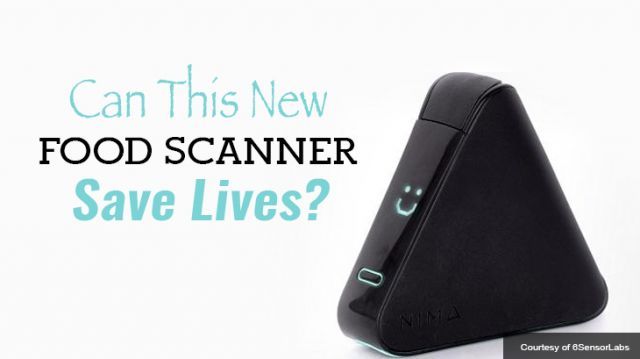The official release is almost here! Named one of Time’s top 25 inventions of 2015, the Nima sensor is the first portable device designed to detect gluten in food. It just might save lives.
The device is on the smaller side and can be easily thrown in a pocket or purse. Utilizing proprietary, disposable capsules, Nima is able to indicate to users whether the tested food is safely gluten-free or not. When you’re good to go, the small interface displays a happy face. When the food isn’t safe, the device frowns at you.
Nima is set to launch sometime this year. You can pre-order the starter kit for $199.
The positives
- A gluten detector has been a long-awaited technology for those of us, like me, with Celiac disease. After dealing with Celiac and food allergies, many of us can attest to the constant anxiety about the safety of the food you are about to eat. It can truly be agonizing! A step toward eliminating this fear is certainly an achievement.
- Those with food allergies and Celiac disease have gotten the short end of the stick lately. While there is constant chatter about the stupidity of the gluten-free fad diet, as well as a misunderstanding about the seriousness of food allergies, many of us have to trudge on and deal with serious food issues every day. When a device like this is introduced, it legitimizes the problems that people with food allergies and Celiac disease face. Awareness can go a long way.
- Of course, the possibilities of this type of technology are endless. While Nima has released only a gluten detector, the company has expressed the possibility of future testing devices for the other common allergens, such as peanuts, tree nuts, soy and beyond.
- This type of device could be particularly useful when traveling abroad. In foreign countries, communicating food allergies in restaurants or food carts can be challenging at best and downright scary at worst. When you’re really questioning your food and you aren’t at home, Nima could save your vacation from the dreaded gluten sickness or even hospitalization.
Possible drawbacks
- It’s possible that utilizing a food-testing device will make people, especially young people, feel even more ostracized from their peers. The reality is, there is a huge social component to having Celiac or food allergies. Sometimes, friends, family or coworkers are offended that you aren’t eating. Or they assume you are watching your weight because you’re eating only carrot sticks. Other times, when people try to make something “gluten free” for you, a pit grows in your stomach because, let’s face it, not everybody understands the level of care and checking that goes into preparing a meal that is fully gluten-free. How will it seem when your dinner party host serves you your meal and you whip out a tester, scoop out a corner of your “gluten free” lasagna, and tell her you just have to make sure?
- While the one-time charge of almost $200 is fair enough, the capsules, which can only be used once, seem really expensive. If you pre-order Nima with 12 extra capsules, the price cranks up to $247, which works out to be $4 per capsule. It will be interesting to see if the company can get the price down after the sensor has been on the market for a while.
- Since the device is small and each capsule is very portable, it also limits how much food you can test. Sure, you might be able to ensure a small portion of your meal is safe, but contamination can be as much as one crumb — and that crumb could be on the other side of your plate. The device seems like it would be better to test for some overt error, such as being served a dish of regular pasta or being served a meal covered in a sauce that was thickened in flour.
Overall, there is certainly promise here. I personally foresee myself purchasing one to use less in everyday situations but more when traveling abroad, where a communication error might result in me being served a meal full of gluten.
Short of something that eliminates Celiac disease or food allergies altogether, this is our first chance to take back some power for our safety. Congratulations to Nima for taking the first step for those with Celiac disease and food allergies.
—Brett Murphy Hunt

